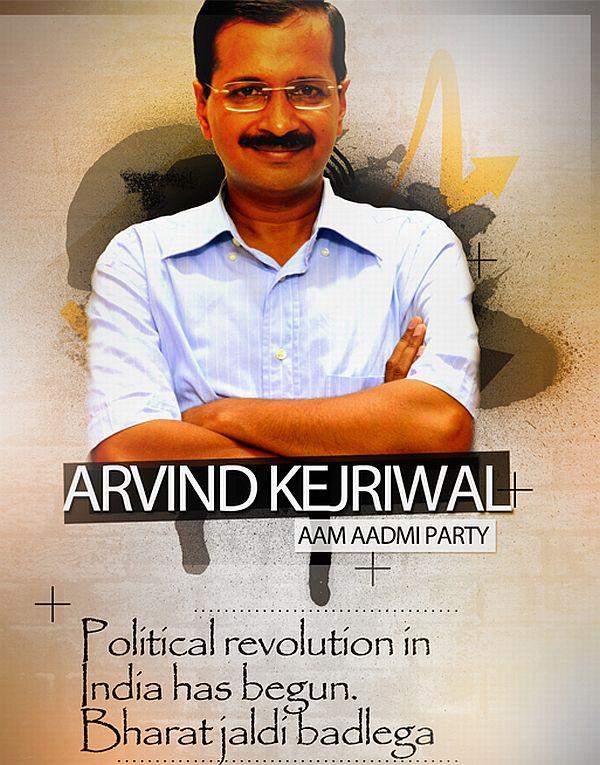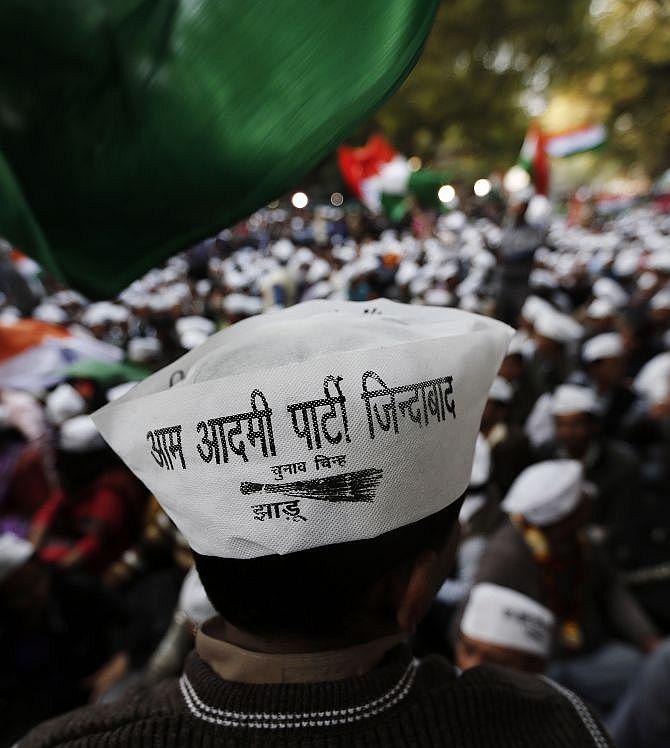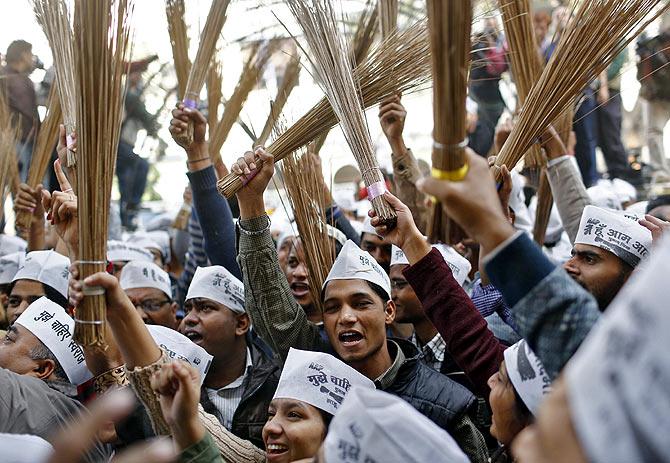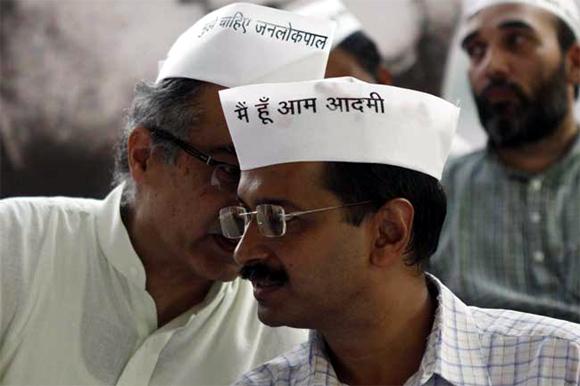 | « Back to article | Print this article |
'AAP needs a constructive agenda to govern and seed real improvement'
Despite missteps, Arvind Kejriwal and his party could move beyond an attacking strategy to improve our polity, says Shyam Ponappa
The turn of events that catapulted Arvind Kejriwal and the Aam Aadmi Party to power in Delhi may have flabbergasted them as much as anyone else.
It might all fizzle out if they take a hard line, following the vengeful path they espoused during their campaign, thereby losing the chance to govern with outside support. But what if they take a more constructive approach?
If they govern at least for some time, it could seed some real improvement. At best, acting responsibly in the public interest while eschewing the populism that has worked so far, they could become a major party. Even if the AAP is reduced to a swing vote, it could still have a salutary effect on all parties. This consideration of strengths, weaknesses, opportunities and threats shows why.
Strengths: ‘Kejriwal has emerged as a strong, charismatic leader’
The AAP has attributes favouring the public interest:
- Integrity (despite some failings);
- Openness, transparency;
- Clean, transparent election funding;
- Antipathy to feudal trappings/"VIP culture";
- Belief in systems (perhaps).
Given Kejriwal's engineering education, his admiration of the Delhi Metro, and his efforts to appoint officers of integrity in key positions, it is possible that integrity, rationality and a systems approach may prevail in governance.
Despite anomalous manifestations on the path to power, popular pressure may now hold the AAP and its members to objective standards, besides compelling other parties and politicians to aspire to these standards.
Witness Rahul Gandhi's denunciation of the ordinance to protect convicted lawmakers, or his intercession on the Adarsh Commission report (although the Bharatiya Janata Party, unfazed, is seeking electoral gains through sectarian alliances in Karnataka).
The other major development is that Kejriwal has emerged as a strong, charismatic leader. This factor alone, which could send the party and the man hurtling in either a positive or negative direction, is of profound importance, because we have sorely lacked such leadership.
Click NEXT to read further...
Weaknesses: 'AAP's populist electioneering is difficult to justify'
The AAP and Kejriwal also have negative attributes that go against the public interest.
They have displayed a defiance of established order combined with a readiness to take to the streets, and a tendency to exclude non-believers. One could argue that this is required to effect change in the face of our predatory politics. But the AAP's populist electioneering is difficult to justify except that it was a winning strategy for the party and Kejriwal. Retrograde ways -- such as operating through coteries, a self-righteous belief in their moral superiority, and confused socialism -- are likely to end badly for them, for the public, and for the economy.
There's little evidence of systems yet. In fact, quite the contrary in their manipulative histrionics, including the reduced electricity charges and free water. Kejriwal's contradictory behaviour could lead to a personality cult that subverts professionals with objectivity and integrity, and results in more anarchy.
For instance, branding all tax inspectors as corrupt, or asking "honest officers" to approach him directly, thereby encouraging breaking ranks instead of instilling coherence and esprit de corps. The problem will be if these headstrong acts bankrupt and demoralise the capital.
Click NEXT to read further...
Opportunities: 'AAP needs to define realistic goals, put together coalitions and workable strategies'
Looking past the hurdles, establishing more realistic expectations, and so on, it is possible to conceive of the AAP taking a positive or a negative arc -- a high road or a low road.
So far, in getting to power, the AAP and Kejriwal have excelled in attacking the establishment and criticising the government, the Opposition, and all politicians and bureaucrats. Having seized the crown of thorns by forming the government, the attacking strategy alone and destructive tactics are of no use. They must now define realistic goals, put together coalitions and workable strategies, and do what it takes to achieve them. This is very different from making dramatic, unrealistic election promises to the gullible, and playing to a headline-seeking media.
They have begun with what looks like a rash fulfilment of unreasonable promises, unless some real domain experts have looked into the finances and know undisclosed but sound ways to fund the treasury. Given their commitment to transparency, they will presumably share these financial details with the public soon. Otherwise, they are just irresponsible politicians grabbing power to loot the treasury.
Click NEXT to read further...
Threats: 'APP must avoid the arrogance associated with power'
There are other worrisome legacies, too, such as the commitment to radical decentralisation and direct democracy. In practice, where these have worked, there has been intense preparation in the citizenry, as in Switzerland. Attempts at less rigorous experimentation, such as in California, destroyed the strengths of a well-developed market, bankrupting an economy about the size of India.
There is certainly a role for local community ‘mohalla sabhas’, but it has to develop and evolve with responsible citizenship, and leadership. So what can we hope for?
That Kejriwal and the AAP:
- Concentrate on effective and efficient service delivery in law and order, infrastructure, ie electricity, water and sewerage, roads, transportation, and the like, and not on vindictive politics;
- Use competent people with domain expertise to address and overcome the daunting challenges in seeking a transformation;
- Define objectives with all stakeholders, and not only their concept of the "aam aadmi";
- Follow the discipline of systematic, goal-oriented flowcharts, project management, and cash flows;
- Drop populism for a social-democratic philosophy, with government as a responsible partner;
In terms of game theory, adopt a collaborative, community-oriented ‘stag hunt’ approach instead of the contentious "prisoner's dilemma" model.
The difficult transition will be to convert everyone to being responsible, law-abiding citizens, the antithesis of what we are today. Yet, the potential for clean, transparent election funding is more real because of their achievement, although much has to be done before it is realised system-wide. If they can avoid the arrogance associated with power and transition constructively on the lines indicated above, they may well succeed in bringing about radical change for the better.




